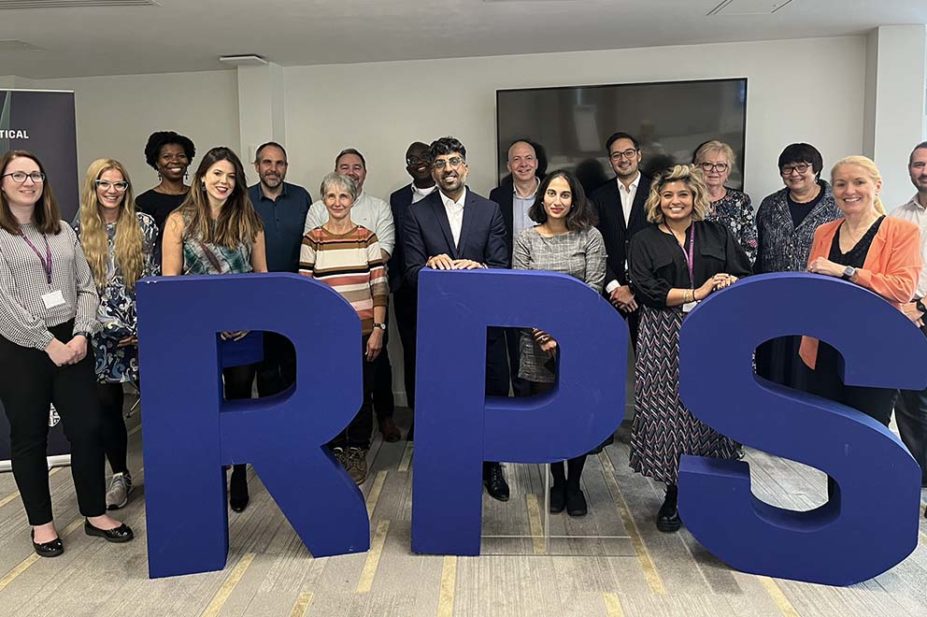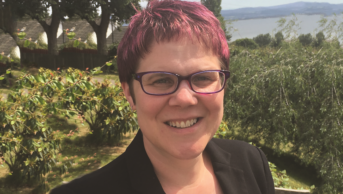
Melissa Dear
The Royal Pharmaceutical Society’s (RPS’s) three national pharmacy boards held a joint meeting of open business on 29 September 2022. This was the first joint board meeting to be held in hybrid format, with some members joining through Zoom and others present in each of the Society’s three national headquarters.
Apologies were received from Iain Bishop, Richard Shearer and Jacqueline Sneddon of the Scottish Pharmacy Board (SPB); Alisdair Jones of the English Pharmacy Board (EPB); and Dylan Jones and Elly Thomas of the Welsh Pharmacy Board (WPB).
Professional leadership
Paul Bennett and Claire Anderson, chief executive and president of the RPS, respectively, updated board members on the independent review of member participation and RPS communications, followed by a discussion on the UK Independent Commission into Pharmacy Professional Leadership.
Independent review of member participation and RPS communications
Bennett reminded attendees that the president had requested a review of member participation and RPS communications, concerning decisions taken on behalf of the profession through RPS governance boards. Luther Pendragon, a communications consultancy, undertook a membership survey, focus groups and interviews with the non-elected Assembly members, and had prepared a report with its findings and several recommendations. The report would be published on 7 October 2022, Bennett said, and there would also be an open meeting with the RPS Assembly that same day to discuss the findings.
Bennett added that there were “likely to be some hard messages in the report, and probably rightly so: it is now up to us to respond”.
UK Independent Commission into Pharmacy Professional Leadership
This review was instigated by the four UK chief pharmaceutical officers (CPhOs) and chaired independently by Nigel Clarke, former chair of the General Pharmaceutical Council, and Jane Dacre, professor of medical education at University College London Medical School. Bennett said it had now concluded its evidence-gathering work and that all registered pharmacists had been invited to complete a questionnaire. He added that the RPS had also submitted an organisational response. The outputs of that process would now be sent to working groups and, in four to six weeks, those would produce a series of outputs for the Commission, which would then make recommendations to the chief pharmaceutical officers.
Anderson, a member of the Commission (on an individual basis rather than a representative of the RPS), noted that, since the last board meeting, the Commission had met with some other royal colleges/societies, who had presented what they do. The working groups would now be meeting twice online, and then meeting again in January 2023, Anderson added.
Workforce pressures
Ravi Sharma, RPS director for England, reminded attendees that, on 6 September 2022, the RPS had issued a statement on ‘Putting the patient first: how pharmacy can get it right‘. The statement highlighted that the sector is “under significant pressure” and set out calls for action under three areas: professionalism, respect and prioritisation.
Sharma said that, since the statement, the Society had been discussing “how we operationalise that, with five key points that we’ll discuss”, which were: advocate for planning strategy in each country; advocate for temporary prioritisation to ease pressure; strongly condemn abuse towards pharmacy staff; inform the public about pressures; and invite employers and unions to a roundtable discussion.
He added that RPS country directors and teams work closely, “but we do believe we need to reflect devolved context”.
Parties will be invited to a roundtable in early December 2022, Sharma said, after which the RPS will produce a report around the five key asks. Boards were asked if they support outlining the work in those five areas; whether the roundtable should be Great Britain- or country-level, and who should be invited to partake in it.
Boards then went into national breakout rooms to share their views.
In the EPB breakout room, member Ewan Maule said that, regarding prioritisation, “something that facilitated local conversations might be useful, but suggestions might not work across all localities”. EPB member Tase Oputu said that, from a secondary care view, hospital pharmacy is “a complex environment operationally” and that “a set of principles is useful but in aseptics, we use capacity planning — is that something we need to be encouraging on a day-to-day basis?”
Thorrun Govind, EPB chair, said that, from experiences during COVID-19, the RPS could say “put a mandatory 30 minutes in your day, closed to the public — which can be staggered with others in your area — to focus on a task and not have interruptions. The workforce is struggling and tired, and we need to protect them”. Sibby Buckle, EPB member and RPS treasurer, said that “for me, it is about pharmacists being responsible and accountable for how they manage the pharmacy and team. If I remove myself for 30 minutes, but my team are competent to run the pharmacy, this should be empowered: it links into the supervision debate too. Pharmacists need to take a break, but look at it in the light of being professionals accountable for our own behaviour.”
Sharma said he was hearing that further scoping needs to be done around prioritisation, before bringing it back to the board; “rest breaks, protected learning time and development might not come overnight and, in the meantime, what can we do to help with pressures and focus attention on implementing the vision work we are doing in England?” EPB member Emma Boxer said that, in her experience, many people are not willing to work under current conditions anymore, “and it reflects on people coming into the profession: if we don’t put short-term measures in, we might find the problem is even worse in five years’ time”.
The discussion then moved on to the roundtable, with Bennett saying that “the roundtable for me is demonstration of how the RPS can bring leadership into this space in a neutral way”.
The board voted unanimously that the roundtable should go ahead and, after discussion, it was agreed that it would be a good idea for it to begin GB-wide and then filter down into country-specific discussions.
Health inequalities policy
Clare Morrison told all three boards that the RPS was planning to develop a policy on pharmacy’s role in addressing health inequalities by the end of 2022. She asked board members to consider what should be included in the policy; what services pharmacists can provide to address health inequalities, and who the experts are that the RPS should consult with in the policy’s development.
The boards went into national breakout rooms to discuss these questions. In the EPB breakout room, Tase Oputu said her first thought was around “public health and ensuring our pharmacy teams have knowledge of the social determinants of health, and their local population”. She added that “data are going to be a big part of this: being able to understand what the data are telling you about your population”. Amandeep Doll said that the idea “sits with ‘Core20PLUS5‘, that the NHS commissioned”, and Ewan Maule said that one of the three aims of Integrated Care Boards (ICBs) is to reduce health inequalities.
Sharma said that developing the policy would be a “massive piece of work”, and that there was a question of how to prioritise it — “maybe ensure it is a core part of the Vision?” he suggested.
Goodbye to Ravi
Closing the morning session, attendees thanked Sharma for his work as director for England and wished him well in his new role. Bennett said Sharma had “made a massive impact, and that will be your legacy: it has been a joy to work with you”. Sharma said it had been a “privilege and honour” to hold the role, adding: “Thank you from the bottom of my heart; I wish the boards and organisation all the best.”
Scotland open business
Clare Morrison, RPS director for Scotland, reflected on the 2022 workplan and introduced scoping for the 2023 plan. In 2022, Morrison noted that RPS Scotland’s vision for pharmacy in 2030 had been published, as well as a joint statement on environmental sustainability and a best practice hub. The Society had also been lobbying on workforce pressures, protected learning time and rest breaks for pharmacists, and had held roundtables on disability and shared patient records.
In terms of planning for 2023, Morrison said feedback from all three boards would be gathered to see what overlap there was, and a draft would then be circulated for feedback. Expert advisory groups had been asked what their suggested priorities would be; examples included: palliative and end-of-life care, from the community pharmacy group; equity in digital use, from the digital group; and homecare standards, from the hospital group. The antimicrobial group raised antimicrobial resistance as a priority; the early careers group raised registration assessment issues; and the primary care group suggested workforce development and support. The RPS professional support and development team had raised gender dysphoria, patient safety and pharmacy professional dilemmas.
Jill Swan, SPB member, said that pharmacogenomics should remain on the workplan, and Andrew Carruthers, chair of the SPB, brought up deliverables around health inequalities.
Tamara Cairney, SPB member, said she was “keen to see us focus on wellbeing, if we’re being asked to do more and more as a profession”, including “how we get the best out of people and don’t make them feel overwhelmed with new roles. Locally, a lot of people are quite scared of being designated prescribing practitioners, but we need more to meet ambitions”.
In summary, Morrison said that she was hearing that the way to move forward is to take workstreams from the previous year into new areas of priorities and “rewriting the workplan around where we are now”.
Wales open business
Summing up achievements against the 2022 workplan, Elen Jones, RPS director for Wales, highlighted work on environmental sustainability, saying that she was “very proud” that the Society had now fully divested from fossil fuels. The RPS in Wales had already met with the Future Generations Commissioner, and the Welsh government was funding a project looking into chemicals and pharmaceutics in water, Jones said.
The RPS had also given a presentation on its sustainability policy to the Association of the British Pharmaceutical Industry’s (ABPI’s) Industry Sustainability Group and, subsequently, representatives from the ABPI had been invited to meet the RPS’ Science and Research Committee to explore further possibilities together, Jones said.
Regarding pharmacogenomics, Jones noted that Sophie Harding, RPS pharmacogenomics lead, was based in Wales but leading on a GB basis and the Society was now considering the next stages in its pharmacogenomics stream.
Looking ahead to the 2023 workplan, Cheryl Way, chair of the WPB, suggested it could remain largely the same, but with some areas becoming more prominent or moving into different areas. Jones asked whether, for example, professional belonging could change to “culture and belonging”. Jones also said that environmental issues would remain “a big one”, including the ABPI discussions.
Concluding the discussion, Jones said that she was “keen for tangibles” and that what had been talked about today was “just a first step to get us thinking” about the workplan. She then asked board members to consider their thoughts, after the meeting.
Minutes of the meeting can be found on the RPS website.
The next meeting date was set for 8 February 2023.


